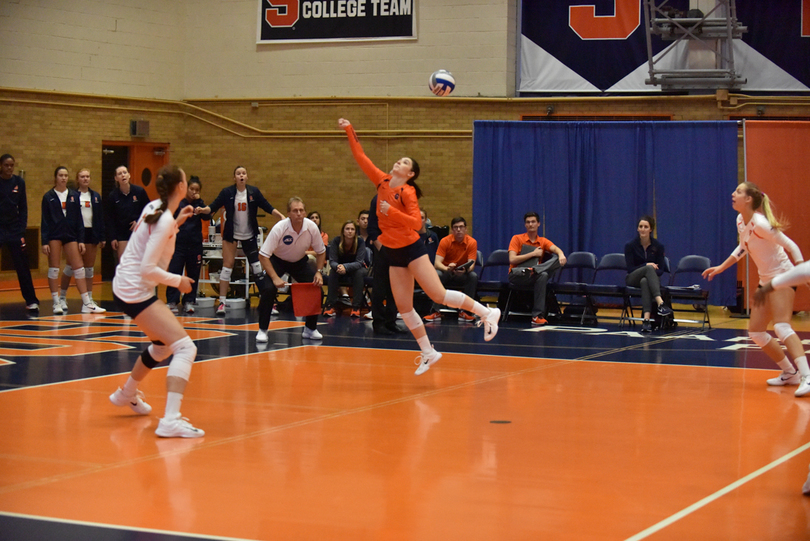Syracuse aims to improve in late-set situations

Syracuse's late-set woes have stemmed from making mistakes in setting and spiking in crunch time. Max Freund | Staff Photographer
With the second set knotted at 24 against North Carolina State on Nov. 3, Syracuse went to its deadliest duo of Jalissa Trotter and Anastasiya Gorelina — the team’s assists and kills leaders, respectively — to even the match after a 25-11 first-set thrashing. Trotter set up Gorelina, who powered the ball into the arms of two Wolfpack blockers and out of bounds, giving SU the point.
After an NC State kill tied the score, Gorelina attempted to give the Orange another set-point opportunity, but hit the ball into the net. Two points later, SU found itself up 27-26, and the ball came to Amber Witherspoon. The senior uncharacteristically set the ball backwards and no SU player could get a strong touch on it, resulting in an error. Syracuse ended up losing the set, 31-29, and the match, 3-0.
“We fought the entire game as a unit, but we literally could not finish,” Witherspoon said. “Those last few pushes we just couldn’t get it done.”
On its four-game losing streak, Syracuse (17-12, 9-7 Atlantic Coast) has squandered four set points. SU’s sloppiness in late-set situations has led to just two set wins in its last 14 opportunities, losing by just two points five different times. The Orange did not have the right players in the right situations to finish, leading to mental and physical errors, head coach Leonid Yelin said.
“When you come into those last two points, certain players are so confident,” Yelin said. “They know what to do, and they will finish the game.”
Down 25-24 in the third set against North Carolina on Nov. 5, Trotter set the ball to an unprepared Santita Ebangwese. Without jumping, Ebangwese swung her outstretched arm in a last-ditch attempt to send the ball over the net. It never made it over, giving the Tar Heels the set, 26-24 and the match, 3-0. Ebangwese led the team with 13 kills against UNC, but was not the right option for Trotter to pass to for the Orange in a time it needed to convert.
When his team has a set point or the game is tied, Yelin will typically call a timeout to slow down his players, telling them to relax and recuperate. It is impossible to control exactly how the players act physically, so Yelin tries to right them mentally, he said.
Calling a timeout to allow his players a breather, Yelin said, is because the game tends to be played faster toward the end of sets and the points carry more magnitude.
“Everyone wants to win so bad, I’m trying to tell them to stay calm,” Yelin said. “Forget what’s happened. We’re good, we’re just one point away.”
Despite Syracuse’s lack of success in its recent run of games, Yelin and his players are proud of how they competed against some of the ACC’s best teams, he said.
SU fended off seven set points against NC State and powered a 6-0 run against UNC after falling behind 24-18 in the third set. The team wasn’t as upset about its performance as it was the result, Witherspoon said.
“I think losing a close set always fuels me for the next set,” sophomore Kendra Lukacs said. “It doesn’t really discourage me.”




